When a Family Can’t Afford Emergency Surgery
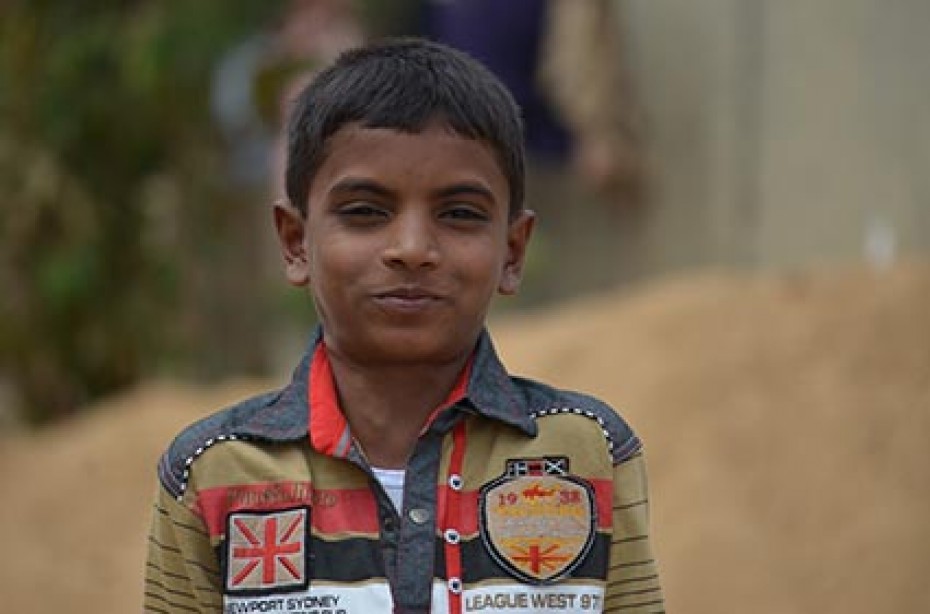
NOTE FROM EDITOR: This content honors Compassion’s historical work in India. While we no longer have an India sponsorship program, we are grateful for the lives changed and meaningful work achieved through our sponsors and donors in our nearly 50 years there. For a detailed explanation of the end of our sponsorship program in India, please visit: compassion.com/india-update.
Superstitious beliefs and a fear of doctors prevent many people in India from taking their sick children to the hospital. They would rather get medicine from a local pharmacy, where pharmacists supply tablets and syrups without a doctor’s prescription.
Hemant’s parents had little awareness of health and education. Hemant’s father, Venkobrao, works as a load man in the market, loading and unloading fruits and vegetables. His job is seasonal and when there is work, he earns about 80 Indian rupees (approximately $1.50 U.S.) a day.
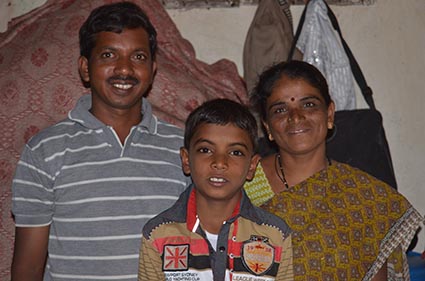
No one knew the reason for Hemant’s chronic sickness. All his parents knew was that he frequently fell ill and suffered. This affected his education as well. With poor school attendance, he fared badly on his exams. When health is a priority, education naturally becomes secondary.
When Hemant fell sick with fever, we counseled his parents and immediately rushed him to a nearby hospital. After a complete checkup he was diagnosed as having three holes in his heart. The doctor told his parents,
“If not treated within six months, your son will die.”
The surgery would cost more than $2,100 U.S. — a sum far above the family’s means. Radhabai, Hemant’s mother, shares,
“Even if we worked all through our life, we could never afford this.”
But thanks to the Complementary Interventions Medical Fund, Hemant received immediate surgery and his life was saved.
Today, Hemant is an active boy in the fifth grade. He is coping in his studies and is involved in sports. He loves to play football and cricket and dreams of becoming a policeman.
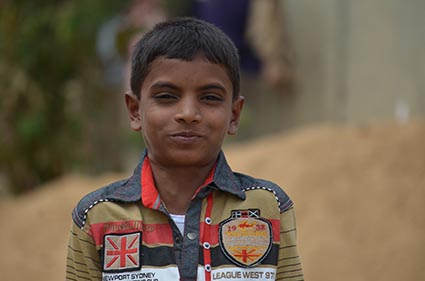
Radhabai shares,
“My days of pain and agony are over now that my son is no longer ill. How relieved I am. If not for Compassion’s help, I could have never seen my son alive. I am so grateful.”
Now Hemant’s family knows there is someone to support them in times of crisis. They realize that they are loved and cared for. As a family, they now believe in God and regularly participate in Sunday worship services.
Continue Reading ›“I Now Care for the Man Who Abused Me.”
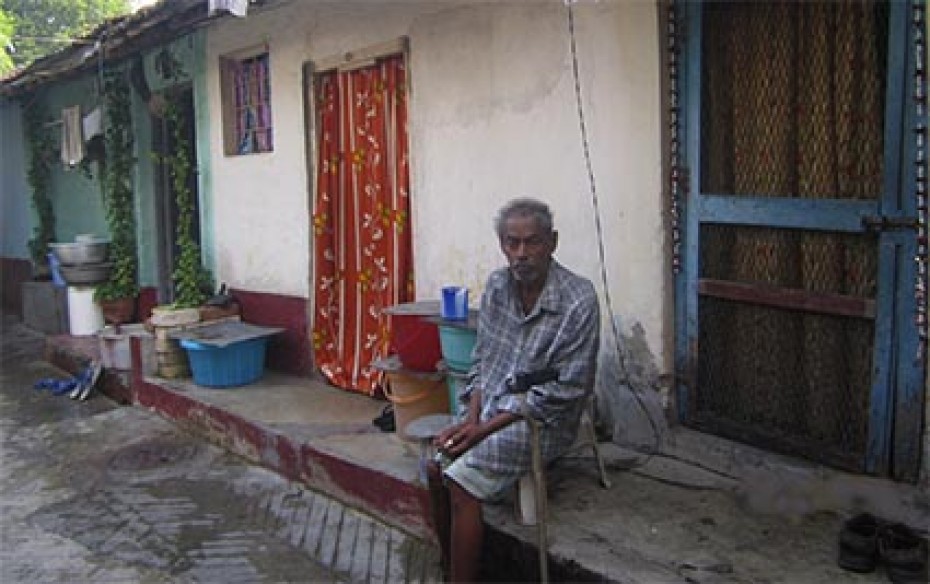
Indian student Maggie nurses her father. She feeds him, dresses him and washes him. Not so long ago, her father systematically abused her.
Continue Reading ›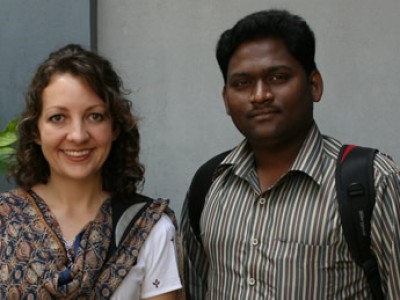
Cook with Compassion: Carrot Kheer
Carrot kheer is a drink from from India made with, you guessed it, carrots. This recipe for carrot kheer was shared with us by staff members, Jayaseelan Enos.
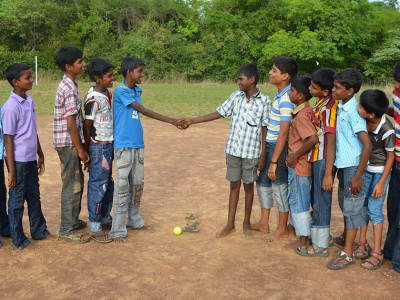
Seven Stones: A Traditional Game in India
Seven stones is a traditional Indian game that is played across the country. It is somewhat similar to dodge ball but it has extra features and is even more aggressive.
Helping Mothers and Babies Thrive
Losing a child and seeing your child suffer are two of the most painful things a mom can face in life. This is why we provide care for mothers and babies through our Child Survival Program.
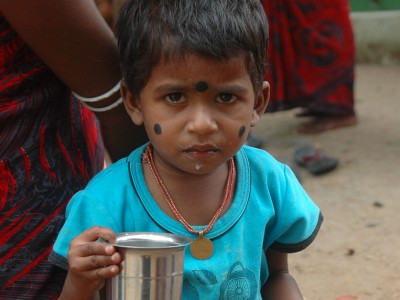
Saving Baby Girls From Infanticide in India
The 21st century has witnessed a great rise in development around the world. Communications and scientific research are developing at a rapid pace. The world is moving toward great change in culture and lifestyle. Gender equality is becoming common in many places, and girls are achieving heights once thought not possible.
However, even as the world is moving toward progress, the age-old social evil of female infanticide still shows its ugly face in developing countries such as India.
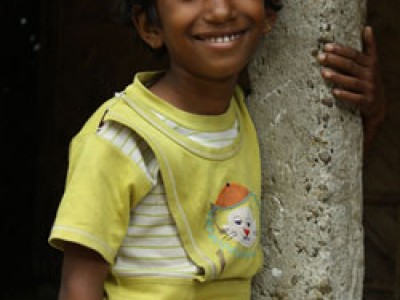
An Intervention on Beauty’s Behalf
Beauty lost her older sister, Ratna, of tuberculosis in 2008. Ratna’s sudden death left everyone in the family emotionally broken and disintegrated.
In the midst of their grief, the whole family had to undergo a series of medical tests for their safety. The test results uncovered a shocking fact; Beauty tested positive and was in the first stage of tuberculosis.
Vallarasu the Outlier
NOTE FROM EDITOR: This content honors Compassion’s historical work in India. While we no longer have an India sponsorship program, we are grateful for the lives changed and meaningful work achieved through our sponsors and donors in our nearly 50 years there. For a detailed explanation of the end of our sponsorship program in India, please visit: compassion.com/india-update.
Outliers are men and women who do things out of the ordinary; men and women who have drive, skill and talent, but who also are given an opportunity to succeed.
“When outliers become outliers it is not just because of their own efforts. It’s because of the contributions of lots of different people and lots of different circumstances.” – Malcolm Gladwell
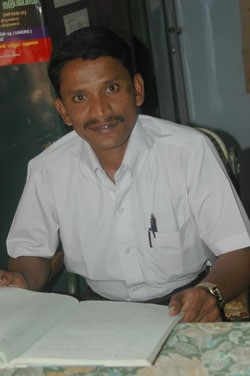 Vallarasu is an outlier.
Vallarasu is an outlier.
Vallarasu hails from Srivalliputhur. He is now 30 years old. Though his physique suggests that he is very soft guy, his words are weighty and powerful. There is a passionate boldness in his face.
Vallarasu’s dad was a shopkeeper and sold household goods. When Vallarasu was 6 years old, his father was murdered by a gang. Thereafter, the family suffered greatly. They had no money to afford even one square meal a day.
One year after the murder, Vallarasu’s mother committed suicide, and Vallarasu and his two sisters were left orphans. His two sisters were brought up by an uncle, but Vallarasu was left behind in the streets.
Compassion found him in the streets, and he was taken into St. Andrews Child Development Center. The center supported him so he could study in the school. The school had a hostel facility, so the center provided him with not only education, but also gave him shelter, food and comfort.
The problems that Vallarasu experienced as a little child instilled a deep burden within his heart. He developed a burning desire to help orphans and desolate children. He took the initiative in solving every little conflict that arose among the children at St. Andrews, and even teachers marveled at his efficiency.
Some teachers commented, “In the future, you will become a big leader in the society.” While others said, “I am sure you will stand as an advocate speaking for thousands in days to come.”
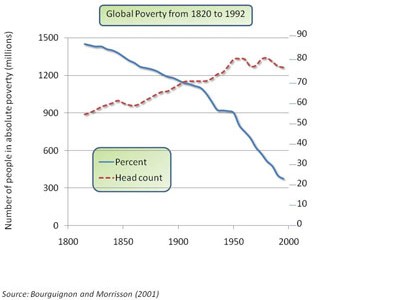
The Ability to Eliminate Extreme Poverty Is Just a Matter of Priorities
The Church’s ability to eliminate extreme poverty is just a matter choosing to do so. We used to say that 40,000 children under age 5 die every day of hunger or preventable diseases. Today, that number is 24,000. These statistics show that in 20 years the number of children who die every day of hunger or preventable diseases has been cut in half. Yet, the birth rate is actually going up. The population is increasing.
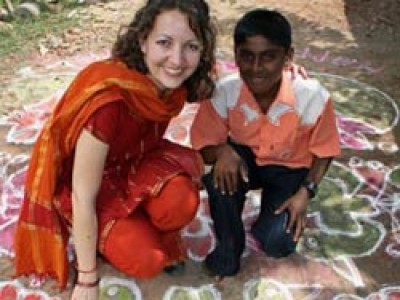
Meeting Sarath
NOTE FROM EDITOR: This content honors Compassion’s historical work in India. While we no longer have an India sponsorship program, we are grateful for the lives changed and meaningful work achieved through our sponsors and donors in our nearly 50 years there. For a detailed explanation of the end of our sponsorship program in India, please visit: compassion.com/india-update.
When I was in India last month, I met the boy I sponsor, Sarath. I had been hoping and praying to meet him, and I just happened to be taking a work trip to India.
I was a bit nervous. Don’t tell, but I’m not great with kids. I know I work at Compassion, but I’m a writer–more natural with a keyboard than with real, live people, let alone children who can smell fear. So I wasn’t sure how this was going to go.
The day I visited his village outside Chennai was Pongal, a festival in the state of Tamil Nadu. Along the way, we saw bright sand drawings outside every doorway and cows adorned with flower garlands for the holiday. I had put on my nicest salwar kameez, vainly worrying he would think I was some weird-looking old white lady.
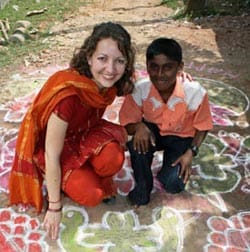
We arrived in Sarath’s neighbhorhood, and I was so happy to see that it was a relatively nice, pleasant place. There was space between the homes, his family had their own bathroom and even a little courtyard to play in and wash dishes.
Sarath was waiting outside. I’d like to say we rushed toward each other and hugged and cried. We didn’t. (I learned on my trip that Indian children don’t seem to be as into hugging as other cultures are.)
We shook hands and he whispered something in my ear. He was very sweet. He was so shy that during the entirety of my visit, he only whispered a couple of short phrases in my ear, so quietly I couldn’t tell if they were in English or Tamil.
We stepped inside and I met his mother, two lovely sisters, aunt, and cousin, who all share the same little room for their home.
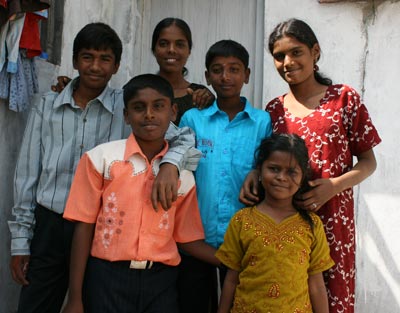
On their shelf was a picture of my husband and I. His mother told me that he likes to call us “Mommy” and “Daddy,” even though the project taught him to call us Auntie and Uncle. Sarath tells his mom that even if she dies, he knows he’ll be OK because there’s someone else who cares about him. (more…)
My Life Of Privilege
I was born into privilege. No, I don’t mean the kind of privilege of living with butlers, maids, fancy cars and mansions. I was born into privilege because my family was able to move to the United States when I was a 5-year-old child, and because of that move I was given the privilege of a life that I would not have had in India.
When our family gets together there is always a story or two told of our childhood in India. When my older brothers talk about our childhood home in Kerala with the lush green plam trees and the rice paddies, their stories seem like make-believe. The smells of the open markets filled with fishmongers and the sounds of the honking cars and buses. In our minds, we often go back to the reality of our dirt-floor home without running water or electricity. Kerosene lamps lit the way down the rocky hill to our home at night after prayer meetings and church services The place where we learned to catch minnows in the creek with our threadbare towels or the well where our mummy drew water for the day.
Strange to remember that life and realize that God allowed it to be the place where I spent my early developmental years. It is also an eye-opening experience to think, “there but for the Grace of God, go I.” What a statement when I think of where I am today and where I could have been, had it not been for God’s great provision in my family’s life. When I think of poverty or what its effects are, it has a personal look and feel because I’ve experienced it as the fabric of my life. My family did not have much, but what we did have were parents who believed in God and sacrificed for a better future for us. I know that today I am at Compassion International as an advocate for children because God orchestrated my childhood to be a starting place for me to recognize need and to empathize with children who do not have the same privilege I was born into.
I was born into privilege, and if you are reading this on your desktop at work or a personal computer at home, then more than likely you were born into privilege also. No, not the “Lifestyles of The Rich and Famous” kind of privilege, but the kind of privilege that we take for granted because we don’t think twice when we turn the knob on a faucet for water or flip a switch for light. Our children are privileged with the requirement and opportunity for an education. We lay claim to the kind of privilege that allows us to walk into clean supermarkets to purchase beautifully packaged foods. We Americans, as a whole, own approximately 40 percent of the world’s wealth but we make up only 2.5 percent of the world’s population. We, my friends are privileged…and with this privilege comes…yes, you’ve guessed it, responsibility. So, as you are looking at these words of mine I have a closing thought. What will you and I do with the responsibility of the privilege we were born into?


